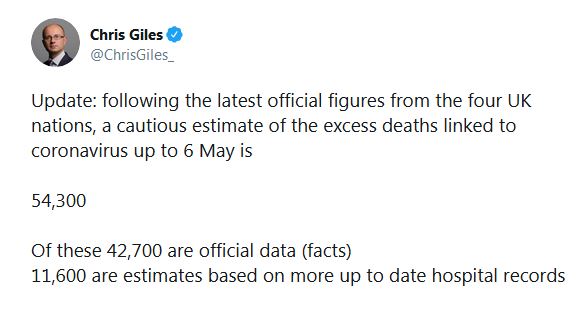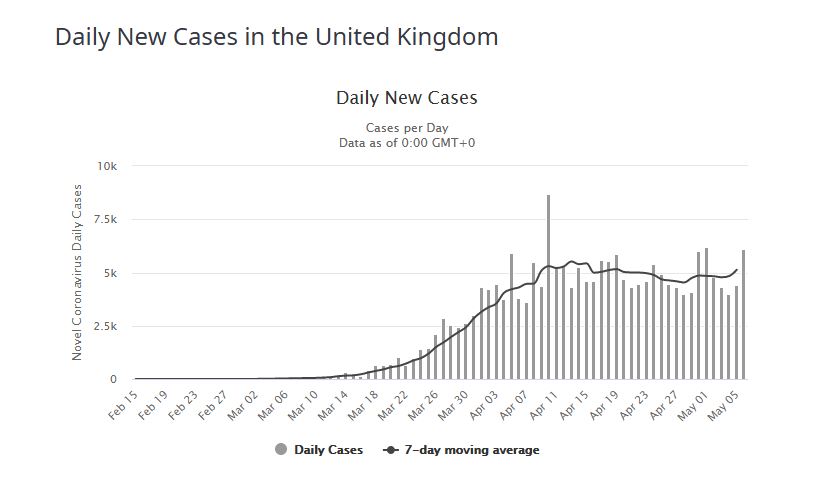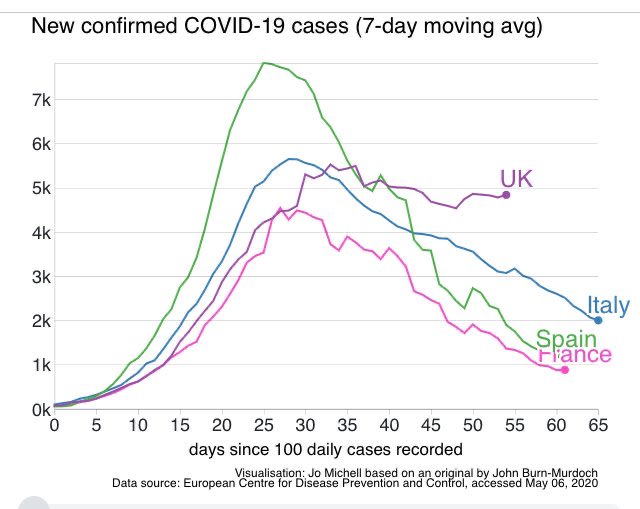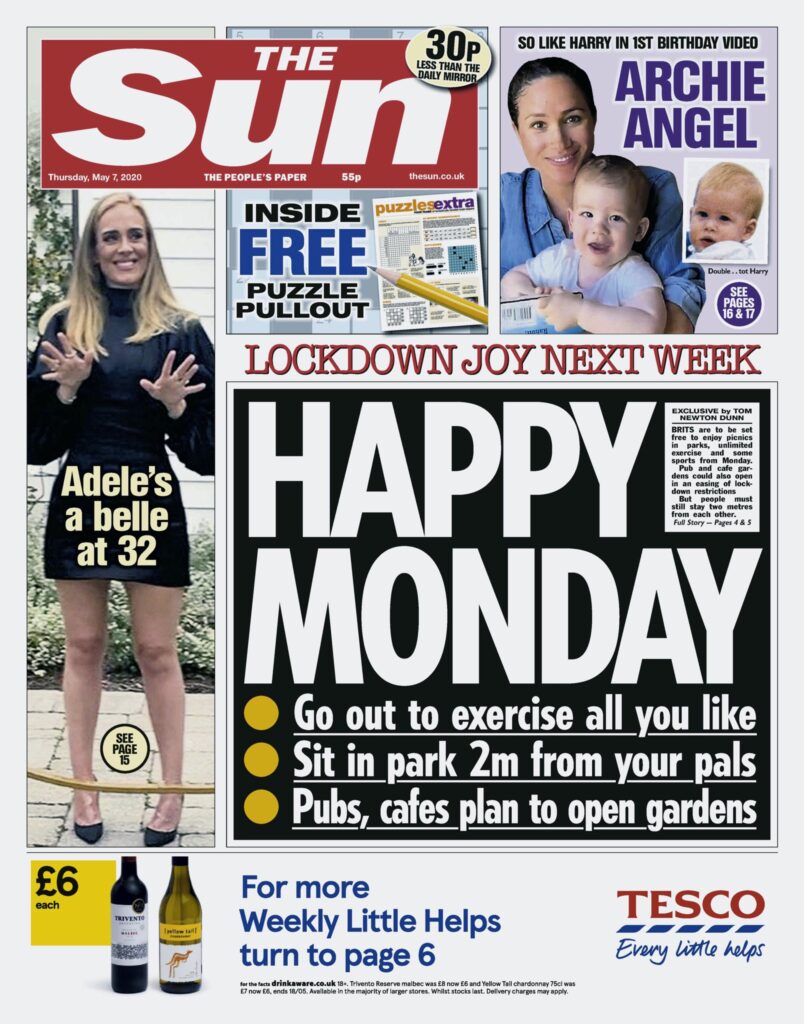This article also appears in The New Statesman.
Ask a scientist or a mathematician, as I have done, what those eleven fateful days in March cost us.
You won’t like the answer.
It has kept me up, my mind spinning like it does when I’ve had too much caffeine, half the night.
The eleven days in question are 12th – 23rd March. Eleven days in which the government decided to give up with contact tracing and do, well, nothing. Mass gatherings were still allowed (because “science”). Concerts and racing and Champions’ League football. Pubs. Public transport. Everything. The over-70s, it must be conceded, were advised to avoid cruises.
Medics in Italy screamed – Do something! Don’t make our mistakes! Are you blind? Look at what happens if you leave it too late!
In those eleven days, our government decided there was nothing to be done. We wrestled open-mouthed with the ideas of “taking it on the chin” and “letting it pass through the community” and “herd immunity”.
Then the government realised that this “strategy” might produce upwards of 250,000 deaths in the UK. It woke up. And it locked down. Not very firmly, it has to be said, compared with other European countries. But still.
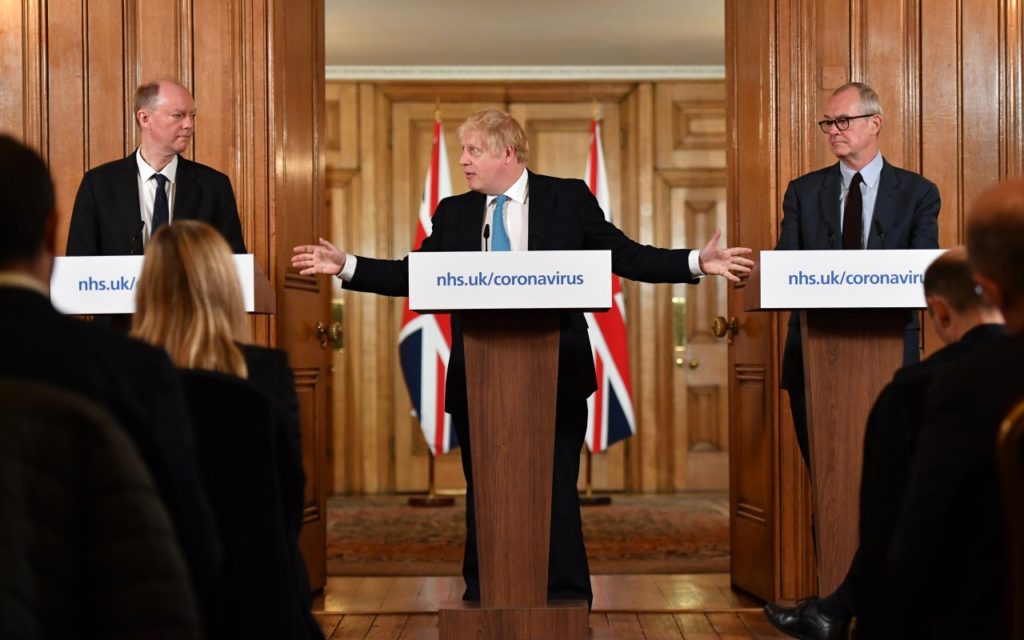
The eleven days during which our government decided there was nothing it could do include the days during which I was asymptomatic with CV-19. I’m confident I picked up my infection on a packed train from Northallerton to London, on March 8th. I had no idea. In the following few days, of maximum infectiousness, I went to King’s College Hospital for a routine ultrasound. A medic there reckoned all the fuss and fear was unnecessary – It’s just like ‘flu, isn’t it? (Remember those days? It’s just like ‘flu!)
I went to shops and cafes and took my kids to school. On 12th March, with our government saying there was nothing to be done and abandoning us to the virus, I tried to buy hand sanitiser, but it was all gone. I went to the Post Office to pay £3 for underpayment of postage on a mystery item, which turned out to be a small tin of Love Heart sweets, a late present for my daughter’s birthday. I passed my credit card to the post office worker to show my ID. At the pharmacy I signed the back of my prescription using a communal pen tied to the till with string. I went to our tiny, closely-aisled Tesco’s. Etc, etc. All the time, I was anxious about catching this invisible virus which was already wreaking such havoc in Italy. I had no idea that my selfish fears were pointless. I had already caught it. I wasn’t catching it. I was spreading it.
The very thought of it is chastening. I probably spread my infection to others using the post office, the pen at the pharmacy, the keypad at the little Tesco’s. I made them ill. I had no idea, of course. No symptoms at all. But I may have killed people. Let’s be honest, almost certainly I infected people, who infected others, who infected still more… and “my” viral spreading will have cost some people their lives. Some families their loved ones.
It doesn’t bear thinking about. It makes me sick. But I had no way of knowing. These were the early days of Covid in the UK. It was still a virus that was “over there” and not here. It was still a virus for older people, not healthy-ish guys in their fifties. Towards the end of those eleven days, on March 19th or 20th, I was starting to realise I had a problem. On the day the government woke up and finally put the UK into lockdown, it was already too late for me. I was gasping for breath and (foolishly) resisting advice to go to hospital. The next day I was in an ambulance, back to King’s. A hospital now completely transformed in the interim since my scan visit. Eerily quiet, and apparently entirely given over to Covid. There seemed to be a massive dissonance between the government’s blasé, laissez-faire public stance, and the complete reorganization of an entire London teaching hospital, impressively ready for the likes of me to start arriving in great numbers. The hospitals knew. They did something. The government must also have known. They did nothing.
Back to those mathematicians and scientists. What did those eleven days of our government standing frozen in the headlights cost us? How many cases? How many lives lost? If I am guilty of spreading the deadly virus, however unwittingly, how about the government? They knew people like me would be going about their business without symptoms, and spreading the virus. They decided to do nothing. How many cases did they, with this knowledge, allow to happen in those eleven days? How many lives did they, with this knowledge, allow to be lost?
The folks who understand maths warn me of all manner of caveats and assumptions. Sure. It’s going to be a highly inexact science. But roughly? Ten per cent? Twenty? Fifty?
No. The answer is somewhere around two thirds. Maybe more. Maybe a lot more. Basically most of them. Basically most of the cases. Basically most of the deaths. Most of the horrible sickness and dread. Most of the loved ones lost.*
Incredible, isn’t it? Thousands of people suffering or dying or grieving because of those eleven arrogant, stupid, murderous days.
Of course we’d have had cases, come what may. My own included. But, had there been a lockdown, I wouldn’t have been out and about and unknowingly spreading. That’s the point.
So now what? First: be clear about the truth. Hold onto it. If anger ensues – and how could it not? – feel the anger. Direct the blame. Murderous, criminal decisions must be seen for what they are. Hold those responsible to account. If anyone tells you not to politicise, or that “now is not the time”, or that you are not an expert, so your opinion is not valid, ignore them. They are gaslighting you. This happened. It really happened. Retain your clarity. Focus your rage. Articulate it.
But of course, we can’t go back. So second: learn from this truth. Learn that our government is incompetent and dishonest. Learn that our government CAN cost us and our loved ones our lives. Demand, then, honesty. Clarity. And – now, right now – demand transparency about the plan (if there is one) for the future, for moving out of lock down. Insist, if and when that plan materialises, that it makes sense. Insist that it does not just take us back to where we were in those eleven days, waving a white flag at the virus and hoping it will be kind to us. Do not allow patently absurd policies to be defended by debate-stifling claims that they are based on “the” science. That can’t wash any more.
Because those eleven days show us that our government has form. Left to its own bewildering devices, it makes terrible decisions. Even now, it fails, daily, to deliver on its promises to the NHS. We’re approaching peak and we don’t have the tests. We don’t have the masks, we don’t have the gloves and we don’t have the gowns. The Treasury talks a big talk on the economy, but only a tiny fraction of its advertised bailout measures have actually been delivered. Parliament is not sitting and the daily Downing Street briefings have become a platform not for the dissemination of unadorned public health information, but for ministers to defend appalling records and then bat away the Skype-garbled questions of journalists, as if this were just everyday politics, and not the crisis – literally – of our lives..
So it is up to us all to challenge, to question, to argue, all day long. It is not “unhelpful” or unpatriotic or whatever else the gaslighters will want us to feel. It is our right. It is our duty. Our lives, our friends’ lives, our families’ lives may very well depend on it.
Post Views: 123,534
Thank you for the extraordinary response to this article (combined readership of over one million). Please help me reach more like-minded people, using the sharing buttons below.
You might also like: my account of being an ‘early adopter’ of Covid-19.
*I’m not sharing the calculations. They’re so rough. I bet there will be researchers somewhere whose curiosity will have had them working on some harder numbers, based on data and good modelling. I guess it could take months for the data to be solid enough. Meanwhile, I encourage them to be brave and share their initial findings.
